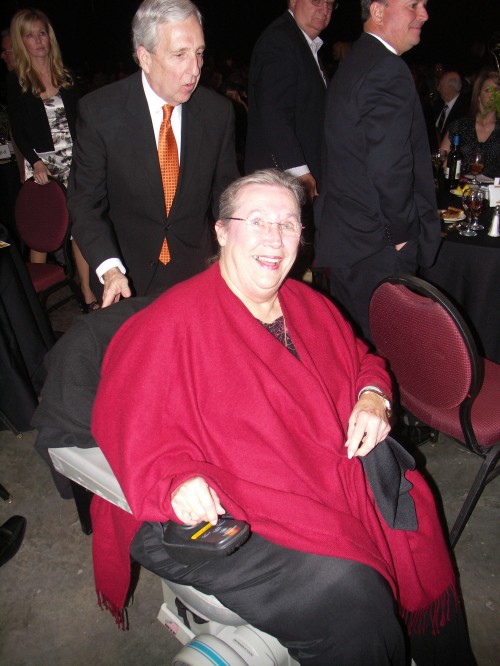Mark G. Plaisance
May 17, 2012
COA director cleared of wrongdoing
May 23, 2012Under the watchful eyes of the Louisiana Department of Wildlife and Fisheries Marine Patrol Division, only one boat tried to get an early start on the May 7 opening of the state’s shrimping season.
“Once you bust someone for illegal shrimping, the word spreads down the bayou pretty quick that we area patrolling and that keeps people from doing it,” Senior Agent Thomas Wolf said. “The ratio from sitting around to busting people is not that good, but that’s good news for us. People are following the rules.”
Sgt. Ted Dewitt, a 20-veteran of the force and Agent Norman Deroche, who has been with LDWF for over a year, accompanied Wolf on the night’s patrol. Sunset came on early as the agents made their way through Lake Decade, with the sun disappearing behind a tall bank of clouds that was moving offshore from the northwest. Wolf steered the vessel through canals and areas including Raccourci Bay and Lake Mechant on toward the coast.
“I feel like it’s the night before Christmas,” Dewitt said. “I think we will catch someone jumping the start tonight.” Waters from the eastern shore of South Pass of the Mississippi River to the Atchafalaya River Ship Channel Buoy Line were scheduled to open for shrimping at 6 a.m.
According to Dept. of Wildlife and Fisheries, which manages and protects Louisiana’s natural resources, the state leads the nation in shrimp production and the state’s shrimp fishery is the state’s largest and most valuable commercial fishery with 2011 landings coming in at more than 90 million pounds.
“The line is a bit jagged around the barrier islands and bays,” Wolf said as he checked the boat’s location on the radar.
The winding trip to the area the agents patrolled is populated with recreational camps and shrimp camps. As they cruised past the structures, several shrimp riggings that had been outfitted with brand new nets, the agents slowed to a crawl to make sure the nets weren’t in the water.
“The tide is going out,” Deroche said. “When the tide goes out, it draws the shrimp out of the marsh and into the canal and then into the nets.”
“Norman is hoping that having someone new with us will bring us good luck,” Wolf said, laughing. “The first time I went on a shrimp detail, we caught a guy who said he shrimped illegally all the time. We confiscated 5,000 pounds of shrimp from a guy once. Norman also helped to make a bust on his first shrimping detail too.”
Once the sun had completely set, agents broke out the FLIR, short for forward looking infrared, night vision binoculars, regular binoculars and a computer pad with a mapping program. Deroche and Dewitt kept their eyes peeled with the equipment while Wolf glided the boat through the water.
“Slow down, I think I see something,” Deroche said as he switched from night vision binoculars to regular binoculars. “Never mind, it’s just an oyster boat, but the drags are not down.”
As the agents made their way down the canal, Wolf pointed to a spot on the radar where he and other agents had recently cited two Houma men for illegal shrimping.
“There will probably be about 100 boats out there tonight,” Dewitt said as the unlit boat moved into the open area where agents would be patrolling.
The lights of shrimp boats dotted the near horizon, and the flashing lights of oilrigs could be seen in the far distance. Lighting could be seen off to the far north.
After a 20-minute cruise, the agents made it to the night’s hiding spot, a pipeline structure, undetected and tied up. Deroche and Wolf quickly climbed the structure’s stairs to get a 180-degree view of the area with the binoculars.
“We were spotted one night,” Wolf said. “Someone on the radio was warning other shrimpers by saying the bogeyman was around the corner. They would be blowing up the radio if they had seen us.”
Once they were back aboard the boat, Dewitt had set the radio to scan to make sure that they were not made out, and everyone took a seat as the wait began. Conversations on fishing conditions, weekend plans, and prior citations handed out filled the night sky, and occasional chatter from shrimpers – ranging from ending a conversation with a fellow shrimper so that another could call his wife to catching a shark in a net – crackled across the airwaves. Several times, shrimpers took a turn entertaining others by holding their microphones up to radio stations playing music.
The agents carefully watched the radar for movement in case a boat was trying to hide in the shadows and for the boats that did have lights on, they checked to see if the boat’s speed was consistent with trawling and then peeked with the binoculars to make sure the vessel’s nets were not in the water.
The agents shift change arrived early in the morning with no illegal activity spotted, and Wolf pointed the boat back toward Cocodrie. On the slow trip back to the dock, a few of the shrimp camps were showing signs of activity – people milling about on the docks, checking gear on boats, and patiently waiting the start of the season.
“I wish we would have caught someone, but compliance with the rules is what we strive for, not issuing someone a citation,” Dewitt said as the trio docked the boat for the night.
A follow-up
“We usually have one boat patrolling at night and we sometimes have up to three boats on the water a night,” said Lieutenant Chad Hebert, supervisor of the shrimping strike force. “It just depends on the number of complaints we bet in an area. We may even put more than one boat in an area if there are a lot of complaints.”
Prior to the shrimping season opener, Hebert said the local force had cited about six to eight shrimpers for harvesting out of season.
“One case was made opening night on the 2-to-6 a.m. patrol, but it has not made it to my desk yet,” Hebert said. “The number of people shrimping illegally has dropped dramatically in the last several years. The prosecution of these cases has been fantastic. Violators are having to pay a whole lot of money in fines.”
According to Hebert, LDWF has been patrolling since long before his 19 years on the force.
“We mainly and regularly target passes along the Gulf,” he said. “Shrimp head through these outlets and out into the Gulf. People can shrimp outside of the line, but some try to sneak across into the state waters. More and more people are being compliant, but we are out there to catch the ones who are not.”
Louisiana Department of Wildlife and Fisheries Senior Agent Thomas Wolf takes a minute from his waterway patrol to take a phone call and coordinate a boating schedule with fellow agents on the shrimping strike force. Thomas was on one of three patrols on duty before the shrimping season opened at 6 a.m. on May 7.









